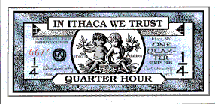
Name: Paul Glover
What he does: Makes money–literally
LATEST TRIUMPH: Helped 18 cities mint their own currencies
In 1991, struggling graphics designer Paul Glover of Ithaca, N.Y., played out every working Joe’s fantasy: He made his own money. Now, half a million dollars of his money has changed hands, and 18 cities are nurturing similar homegrown plans.
Glover’s idea was simple enough: Community members can earn locally printed money by performing a service or providing a good. The dollar-sized Ithaca HOURS, worth $10 apiece to represent the hourly wage in Tompkins County, can be traded for goods and services. Most importantly, money can’t leave the community by way of chain stores, such as Wal-Mart or McDonald’s.
What started as a barter experiment between Glover and about 90 friends has grown to include 250 businesses and nearly 1,500 participants who support the self-sustaining project. While Ithaca has relatively low unemployment, many residents find work seasonally and for little money, creating a high rate of working poor.
“We’re in a depression,” says Margaret McCasland. Her daycare program accepts HOURS, and she says the currency provides flexible work opportunities during rough times. A while back, she advertised what services she could offer from home (mending clothes, tutoring) through the project’s newspaper, Ithaca Money. Eventually, it helped her save enough to start her daycare program. 
Glover’s idea is catching on. Communities in 13 other states have designed their own monetary systems with local flair (Ka’u, Hawaii, uses Pineapple Dollars). Glover says he hopes for more local currencies, with rules that “benefit people, rather than banks and corporate elites.”
For more information, write Paul Glover at P.O. Box 6578, Ithaca, NY 14851.















